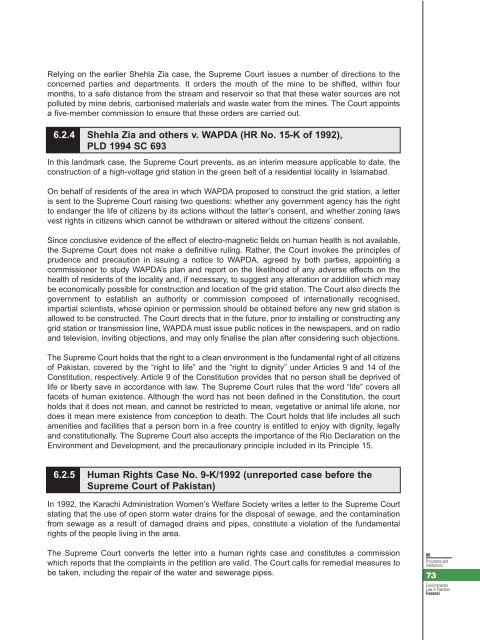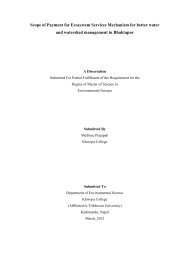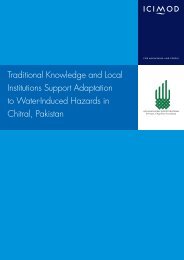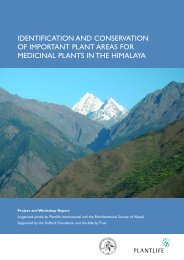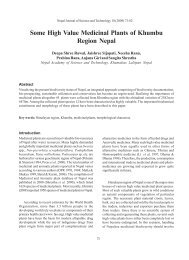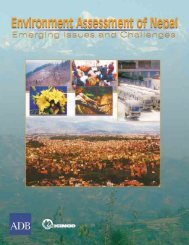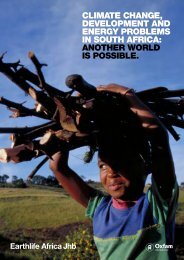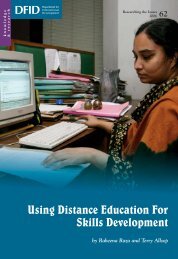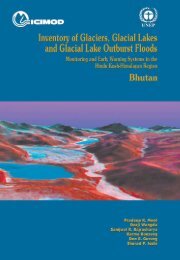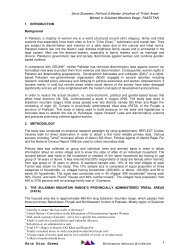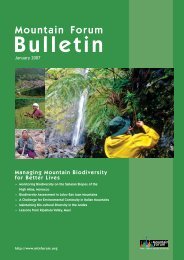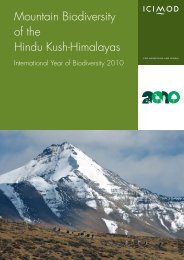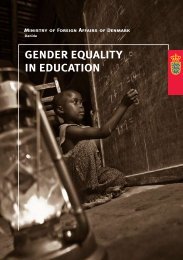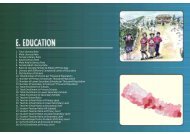Environmental Law in Pakistan - IUCN
Environmental Law in Pakistan - IUCN
Environmental Law in Pakistan - IUCN
You also want an ePaper? Increase the reach of your titles
YUMPU automatically turns print PDFs into web optimized ePapers that Google loves.
Rely<strong>in</strong>g on the earlier Shehla Zia case, the Supreme Court issues a number of directions to theconcerned parties and departments. It orders the mouth of the m<strong>in</strong>e to be shifted, with<strong>in</strong> fourmonths, to a safe distance from the stream and reservoir so that that these water sources are notpolluted by m<strong>in</strong>e debris, carbonised materials and waste water from the m<strong>in</strong>es. The Court appo<strong>in</strong>tsa five-member commission to ensure that these orders are carried out.6.2.4 Shehla Zia and others v. WAPDA (HR No. 15-K of 1992),PLD 1994 SC 693In this landmark case, the Supreme Court prevents, as an <strong>in</strong>terim measure applicable to date, theconstruction of a high-voltage grid station <strong>in</strong> the green belt of a residential locality <strong>in</strong> Islamabad.On behalf of residents of the area <strong>in</strong> which WAPDA proposed to construct the grid station, a letteris sent to the Supreme Court rais<strong>in</strong>g two questions: whether any government agency has the rightto endanger the life of citizens by its actions without the latter’s consent, and whether zon<strong>in</strong>g lawsvest rights <strong>in</strong> citizens which cannot be withdrawn or altered without the citizens’ consent.S<strong>in</strong>ce conclusive evidence of the effect of electro-magnetic fields on human health is not available,the Supreme Court does not make a def<strong>in</strong>itive rul<strong>in</strong>g. Rather, the Court <strong>in</strong>vokes the pr<strong>in</strong>ciples ofprudence and precaution <strong>in</strong> issu<strong>in</strong>g a notice to WAPDA, agreed by both parties, appo<strong>in</strong>t<strong>in</strong>g acommissioner to study WAPDA’s plan and report on the likelihood of any adverse effects on thehealth of residents of the locality and, if necessary, to suggest any alteration or addition which maybe economically possible for construction and location of the grid station. The Court also directs thegovernment to establish an authority or commission composed of <strong>in</strong>ternationally recognised,impartial scientists, whose op<strong>in</strong>ion or permission should be obta<strong>in</strong>ed before any new grid station isallowed to be constructed. The Court directs that <strong>in</strong> the future, prior to <strong>in</strong>stall<strong>in</strong>g or construct<strong>in</strong>g anygrid station or transmission l<strong>in</strong>e, WAPDA must issue public notices <strong>in</strong> the newspapers, and on radioand television, <strong>in</strong>vit<strong>in</strong>g objections, and may only f<strong>in</strong>alise the plan after consider<strong>in</strong>g such objections.The Supreme Court holds that the right to a clean environment is the fundamental right of all citizensof <strong>Pakistan</strong>, covered by the “right to life” and the “right to dignity” under Articles 9 and 14 of theConstitution, respectively. Article 9 of the Constitution provides that no person shall be deprived oflife or liberty save <strong>in</strong> accordance with law. The Supreme Court rules that the word “life” covers allfacets of human existence. Although the word has not been def<strong>in</strong>ed <strong>in</strong> the Constitution, the courtholds that it does not mean, and cannot be restricted to mean, vegetative or animal life alone, nordoes it mean mere existence from conception to death. The Court holds that life <strong>in</strong>cludes all suchamenities and facilities that a person born <strong>in</strong> a free country is entitled to enjoy with dignity, legallyand constitutionally. The Supreme Court also accepts the importance of the Rio Declaration on theEnvironment and Development, and the precautionary pr<strong>in</strong>ciple <strong>in</strong>cluded <strong>in</strong> its Pr<strong>in</strong>ciple 15.6.2.5 Human Rights Case No. 9-K/1992 (unreported case before theSupreme Court of <strong>Pakistan</strong>)In 1992, the Karachi Adm<strong>in</strong>istration Women’s Welfare Society writes a letter to the Supreme Courtstat<strong>in</strong>g that the use of open storm water dra<strong>in</strong>s for the disposal of sewage, and the contam<strong>in</strong>ationfrom sewage as a result of damaged dra<strong>in</strong>s and pipes, constitute a violation of the fundamentalrights of the people liv<strong>in</strong>g <strong>in</strong> the area.The Supreme Court converts the letter <strong>in</strong>to a human rights case and constitutes a commissionwhich reports that the compla<strong>in</strong>ts <strong>in</strong> the petition are valid. The Court calls for remedial measures tobe taken, <strong>in</strong>clud<strong>in</strong>g the repair of the water and sewerage pipes. 7306Processes andInstitutions<strong>Environmental</strong><strong>Law</strong> <strong>in</strong> <strong>Pakistan</strong>Federal


